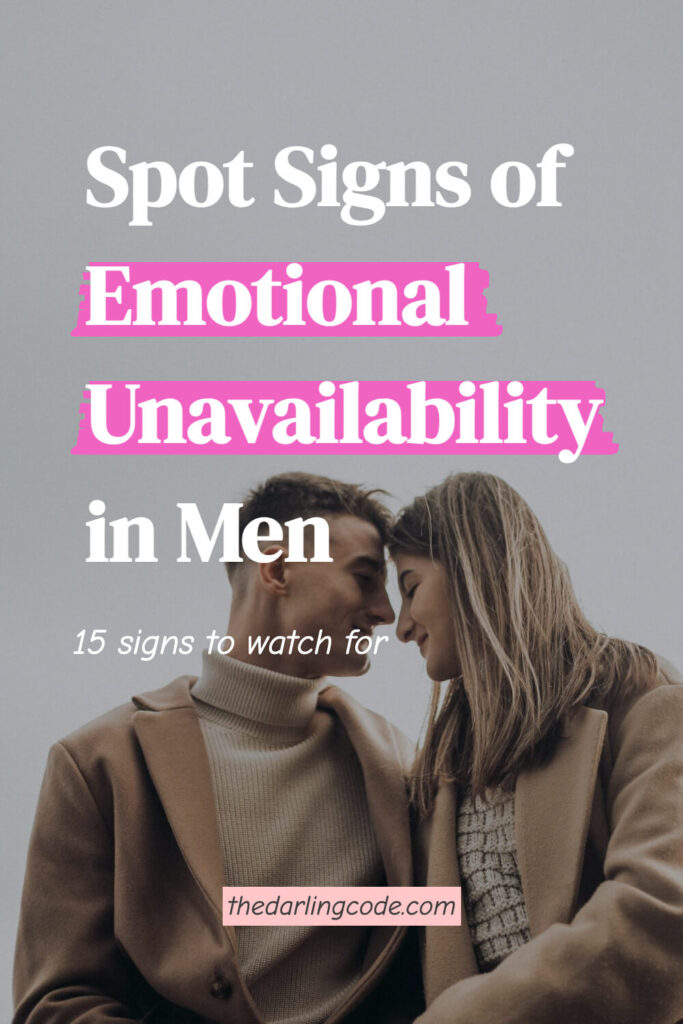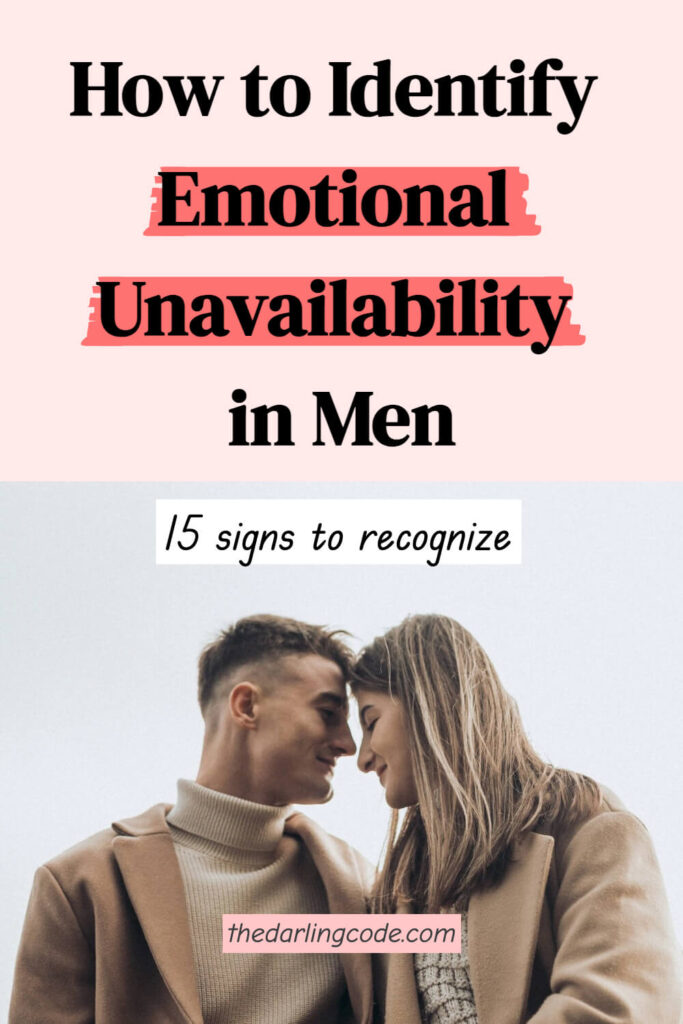15 Signs of Emotional Unavailability in Men (And How to Navigate Them With Grace)
The experiences shared in this article are based on real emotional journeys, but all personal details are anonymized and used with the explicit written permission of the clients. Any resemblance to actual persons, living or dead, is purely coincidental. We are committed to treating all client stories with the utmost confidentiality and respect.
The Coffee Shop Confession
Last winter, a client I’ll call Leah sat across from me at a cozy Seattle café, stirring her latte absently.
“He’s everything I’ve ever wanted,” she said, her voice cracking. “But when I told him I loved him, he just…changed the subject to his fantasy football league.”
Leah’s story isn’t unique.
Over my years as a relationship coach, I’ve guided countless women through the fog of loving someone who struggles to meet them emotionally.
Emotional unavailability isn’t about malice—it’s often rooted in fear, past wounds, or unexamined patterns.
Let’s explore 15 subtle signs and compassionate strategies to reclaim your peace.
Save this article for later—Pin it to Pinterest and come back when you need it! 📌

1. The Future-Phobic Philosopher
“Let’s just see where things go!”
What it looks like: Every conversation about next month’s plans gets deflected with vague optimism.
You mention a friend’s destination wedding in Hawaii next year; he jokes, “I’ll bring my snorkel…if we’re still doing this whole dating thing!”
Why it stings: Avoidance of concrete commitments often masks a fear of true intimacy.
A client’s story: Emily dated a startup founder who’d wax poetic about their “potential future adventures” but panicked when she asked to define the relationship after six months.
Try this: “I’m someone who values clarity—could we talk about what ‘seeing where things go’ means to you?” Notice if he engages thoughtfully or retreats into humor.
2. The Emotional Archivist
“My childhood? Oh, it was…fine.”
The pattern: After four months, you know his coffee order, workout routine, and favorite Star Wars movie…but his eyes glaze over when you ask how his parents’ divorce affected him.
My experience: Years ago, I dated a charming journalist who could dissect political scandals for hours. But when I shared my fears about launching my coaching business, he responded with a spreadsheet of “market opportunities.” The message? Your feelings are problems to solve.
Action step: Softly name what’s missing: “I’d love to know you beyond the headlines—what’s something you’ve never told a first date?”
3. The Hot-and-Cold Connoisseur
Ghosting you for days, then bombarding you with memes at midnight.
Real-life scenario: Sarah’s situationship would plan elaborate dates (think: rooftop sushi dinners) then disappear for weeks, claiming he was “swamped with work.” When she called him out, he accused her of being “needy.”
The truth: Inconsistency often reflects internal conflict—not your worth.
Try this: Track patterns for three weeks. If he initiates plans 0/3 times, say: “I’ve noticed X pattern. I need Y to feel valued. Can we align on this?” If he dismisses you, see #15.
4. The Compliment Deflector
“You’re amazing.” / “Yeah, right—you should see me trying to parallel park.”
Why it matters: Difficulty receiving love often signals discomfort with vulnerability.
A client’s ‘aha’ moment: When Rachel told her partner his empathy made her feel safe, he scoffed, “I’m just recycling lines from my therapist.” His self-deprecation kept their connection shallow.
Your move: “I mean what I said—you don’t have to agree, but could you let it land?”
5. The Conflict Cartographer
Maps exit routes when conversations get real.
Example: You express hurt that he forgot your birthday. He responds with:
- Deflection (“My ex used to weaponize dates like this!”)
- Intellectualizing (“Let’s discuss the cultural pressure of birthday expectations”)
- Escapism (“I’ll make it up to you!” → no follow-through)
Try this: Name the dynamic calmly: “I’m not attacking you—I just want us to understand each other. Can we try that?”
6. The Nostalgia Dealer
“My last relationship was a nightmare…”
The trap: He shares traumatic ex stories that:
- Elicit your compassion
- Subtly warn: “Don’t expect much from me”
Client case study: Mark (32) bonded with dates over his “crazy ex” tales.
My client Mia realized: His stories weren’t warnings—they were excuses to stay guarded.
Your script: “I’m sorry that happened. How has it shaped what you want now?” If he can’t answer, proceed cautiously.
7. The Intimacy Accountant
Keeps score of vulnerabilities.
Example: You share a painful memory; he responds with a “matched” story (“That’s nothing—once I…”) rather than empathy.
Why it hurts: Emotional reciprocity feels transactional.
My lesson: Early in my career, I advised a woman whose partner treated emotional exchanges like tit-for-tat: “I told you about my dad, so now you owe me a childhood trauma.” Spoiler: They didn’t last.
Action: Gently redirect: “I wasn’t looking to compare—just to share.”
8. The Ambiguity Artist
Master of mixed signals.
Text message whiplash:
Monday: “You’re my favorite person 😍”
Wednesday: “Work’s crazy—talk next week?”
The psychology: Unconscious testing: “Will she stick around if I’m unreliable?”
Try this: Stop playing interpreter. Say: “I’m getting conflicting messages—can you clarify your intentions?”
9. The Emotional Tourist
Loves your vibe, avoids your depths.
Classic move: Praises your “chill” personality but panics when you have needs.
Client example: Jenna’s boyfriend adored her “low-maintenance” nature…until she asked for more quality time. He accused her of “changing the rules.”
Truth bomb: Being “easy to love” shouldn’t require erasing your humanity.
Your line: “I’m human—some days I’ll be sunshine, others I’ll need shelter. Can you handle both?”
10. The Crisis Romantic
Only connects through chaos.
Pattern: Meaningful conversations happen only during:
- Late-night existential crises
- Post-breakup vulnerability
- Drunk confessions
Red flag: You’re his therapist, not his partner.
Action plan: “I care, but I need us to connect in the calm too.”
11. The Privacy Purist
“I don’t do PDA/relationship posts/meet friends.”
Nuance matters: Healthy boundaries ≠ secrecy.
A client’s wake-up call: Lila dated a man for eight months who refused to introduce her to friends. Turns out, he’d never told them he’d broken up with his ex.
Your question: “Is this privacy, or are we hiding?”
12. The Growth Resistor
“This is just who I am.”
The issue: Uses “authenticity” as a shield against accountability.
Real talk: Healthy partners evolve together.
Script: “I’m not asking you to change—I’m asking you to care how your actions affect me.”
13. The Empathy Spectator
Watches your pain from the stands.
Example: You’re crying; he offers a tissue but says, “I’m not good with feelings.”
Harsh truth: Emotional skills can be learned—if he’s willing.
Try: “You don’t need to fix it—just stay here with me.”
14. The Retroactive Editor
Rewrites relationship history.
Gaslighting lite: “We never said we were exclusive!” (After months of acting like a boyfriend)
Defense strategy: Keep a private journal. Facts > fog.
15. The Self-Sabotage Specialist
Creates chaos to avoid calm.
Final client story: When Kate’s partner sensed her pulling away, he’d suddenly plan romantic getaways…then pick fights upon arrival.
The wake-up call: Chaos feels safer than true intimacy for some.
Your power move: “I’m stepping back from this pattern. Let me know if you’re ready to build something steady.”
Final Words from The Darling Code
If these signs feel familiar, please know: Your longing for connection isn’t “too much”—it’s human.
Start here:
- The 5-4-3 Grounding Technique
When anxiety hits, ask:
- 5 things you see
- 4 things you feel
- 3 things you hear
This brings you back to your worth.
- The 24-Hour Rule
Before reacting to his mixed signal, pause. Ask: “Would I accept this from a friend?” - The Love Litmus Test
Write down: “A loving partner would ______.” Compare to his actions.
You’re not choosing between him and loneliness—you’re choosing between fantasy and the nourishing love you’re here to give…and receive.
With heart,
The Darling Code
PS: Save this to your Pinterest “Relationship Wellness” board, and try today’s tiny brave step: Text a friend one way you’ll honor your heart this week. (Example: “I’m not checking his Instagram stories today!”)
Got value from this article? Pin it to Pinterest for easy reference and help others discover it! 🌟


ABOUT THE AUTHOR
Vivienne, Relationship Coach & Self Love Coach
Vivienne is a Relationship Coach and Self-Love Coach who believes the key to great relationships starts with YOU. She helps individuals and couples build confidence, set healthy boundaries, and create connections that truly honor who they are.






